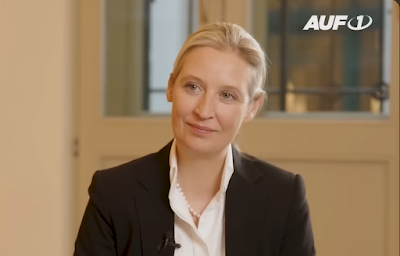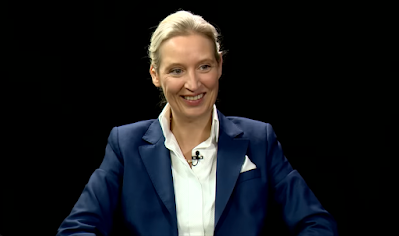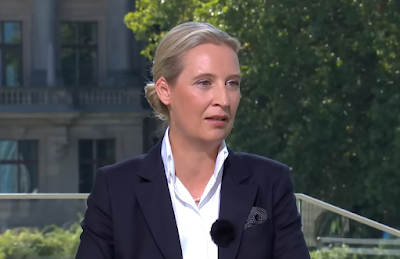Alice Weidel is a well-known figure among the conservative AfD party's lawmakers. Her personal life, romantic relationship, and political career are all topics up for discussion in this article.
Without Alice Weidel, the AfD would be inconceivable. This far-right politician has risen rapidly through the ranks since she joined the party in 2013; she now serves as the AfD's federal spokesman and heads the party's parliamentary group in the Bundestag. By taking these stands, the politician not only stirs up trouble, but also diversifies and feminineizes the so-called Alternative for Germany in the eyes of the outside world.
However, where did Weidel's involvement in politics start? May I inquire about her business associate? Do you really need any more information on the personal life and political career of the right-wing populist? A brief summary of the key facts on the AfD politician.
Alice Weidel profile
Important details regarding Alice Weidel's personal life, including her spouse, children, and home
Alice Weidel came into this world in Gütersloh on February 6, 1979. She attended East Westphalia's CJD High School in Versmold (now North Rhine-Westphalia) and graduated in 1998. She had two siblings during her time there.
Education life of Alice Weidel: Weidel graduated from the University of Bayreuth in 2004 with a degree in economics and a concentration in business administration, placing her among the top students in her class. She earned her Ph.D. in 2011 after completing a dissertation on China's legal system's potential future and earning first-class honours. With funding from the German Academic Exchange Service of the Ministry of Education and the Konrad Adenauer Foundation Scholarships, which are associated with the CDU, she spent a short period of time in China doing research for her project.
Career of Alice Weidel: Upon finishing her studies, Weidel worked for about one year as an asset management analyst in the Frankfurt am Main branch of Goldman Sachs. As a management consultant, she went into business by herself after stints at Heristo and Allianz Global Investors.
Partner and family of Alice Weidel: Sarah Bossard, an actress and Swiss film and TV production manager, is a Sri Lankan national and Alice Weidel's partner. The couple lives in a recognised civil partnership. Couple is taking care of two boys.
Alice Weidel resides in Überlingen on Lake Constance and is in Berlin while the Bundestag is in session, according to her own knowledge. But in 2017, she was registered and paid taxes in Biel, according to the Swiss authorities. Weidel said "how every working parent" should try to use their limited leisure time with their family and verified that they had a second home in Switzerland.
The head of the district office in Einsiedeln, central Switzerland, informed the newspaper "Blick" that the lawmaker, her spouse, and their two boys had been residing there since 2019. as promised. You still list Germany as your tax home and primary abode, as far as you are aware. If Weidel's primary home was in Switzerland, she would only be subject to tax evasion charges.
Alice Weidel in politics: The most important stage of her career
Alice Weidel became the second vice president of the so-called Alternative for Germany in October 2013, only six months after the party's founding. He eventually made it into the party's federal executive board after a long time had passed. She sought but was not elected to the Baden-Württemberg state parliament in the 2016 election.
Even though she had been the front-runner in the race for state chairperson, the politician lost in 2017. It was because her lesbian relationship did not "conform to the conservative image of the family" that some in her party organised to have her removed from office, according to Weidel's retrospective observations. standing in for.
However, in 2017, the politician teamed up with Alexander Gauland to become the leading candidate for the federal election. The AfD had its strongest showing at the federal level to date, receiving 12.6% of the second ballots. Weidel was elected to the Bundestag on the party line.
There, she rose to the position of parliamentary group leader, first for Gauland and then for Tino Chrupalla. Weidel was elected to the position of deputy in 2019, and then to the position of federal chairperson, or spokesman, of the AfD in 2022. Chrupalla is notified of the post by her. She was once again the AfD's leading candidate in the 2021 federal election.
What issues does the Alice Weidel advocate for?
Alice Weidel, as reported by "Zeit," formerly resided in a left-wing alternative community. The "Focus" is authored by individuals from left-liberal circles. However, the situation has already shifted: The politician now espouses right-wing populist ideologies and maintains affiliations with right-wing extremist groups. Weide supports many important causes, including:
Immigration and asylum policy: Alice Weidel, like the whole AfD, prioritises refugee and migration concerns in her work and argues that "there is no significant question of our time (...) that is more important than the issue of migration." She views the arrival of migrants as an immeasurable strain on the economy and the social system, and cautions of a purported "collapse". She disregards the opinions of business executives and migration academics who strongly push for more immigration to Germany, particularly as a means to ensure economic growth. Weidel sparked controversy with her remarks in the Bundestag, referring to "burkas, girls wearing headscarves, armed men, and other individuals deemed unproductive." Uttered. She consistently depicts immigration as "criminals."
Economic liberalism: Weidel advocates for liberal stances on economic policy. She opposes the concept of a minimum salary and supports the elimination of inheritance tax. Additionally, she expressed support for Germany's withdrawal from the Eurozone. According to research conducted by "Zeit," Weidel employed a Syrian immigrant who was considered to be "black" and consequently undocumented. The lawmaker refuted the accusations, asserting that it was a "cordial interaction" based on information provided by her legal representative. Weidel subsequently characterised the woman's labour inside her residence as "uncompensated companionship services."
Climate change: Weidel has consistently refuted the notion of anthropogenic climate change in previous instances. She holds the belief that human effect on the climate is not substantial. Weidel denounced the findings from the Intergovernmental Panel on Climate Change as engaging in political advocacy. The politician's actions contradict the overwhelming consensus of climate science, which, based on studies, establishes direct links between emissions released by global industries and rising temperatures, resulting in severe repercussions like the rise in sea levels.
Controversies and achievements of Alice Weidel
From humble beginnings as a party member, Alice Weidel rose quickly through the ranks to become the AfD's most prominent woman in within a decade. She co-ordinates party operations with Tino Chrupalla. Weidel was reportedly eager to be nominated as the AfD's chancellor candidate for the 2025 federal election and was immediately regarded a frontrunner when the news broke. On the other hand, Weidel has come under fire from inside the party for the way he announced his candidate for chancellor behind closed doors. Her detractors claim that she isn't dedicated enough to the party and that she often acts independently of party policy.
The politician has a history of controversy, which is attributable in part to her provocationous remarks and behaviour. After CSU General Secretary Andreas Scheuer ordered her to separate herself from Alexander Gauland and Björn Höcke, she departed the ZDF election show "Germany, how are you?" in early September 2017. While ZDF editor-in-chief Peter Frey was speaking from a production, media experts saw Weidel's actions as a strategic campaign move.
Weidel stood for contrasting views during the corona epidemic. She eventually came out strongly against the federal government's actions, despite her earlier calls for even stricter restrictions and claims that the virus may "spread unhindered" in Germany. After the initial lockdown, she demanded that the economy be restored right away. Weidel refuted the claim that hospital critical care units handled mostly unvaccinated patients in a December 2021 interview. The Federal Statistical Office, to which she was alluding, has made it very plain that the data in question does not exist.
Some have voiced their disapproval of Weidel due to his ties to right-wing extremist groups. Götz Kubitschek, a right-wing fanatic, runs the Institute for State Policy, where she was a guest in September. Additionally, she was the voice of the New Right after publishing an essay in "Junge Freiheit," a publication that lawmakers saw as straddling the line between conservatism and right-wing extremism.
Source: Morgenpost





